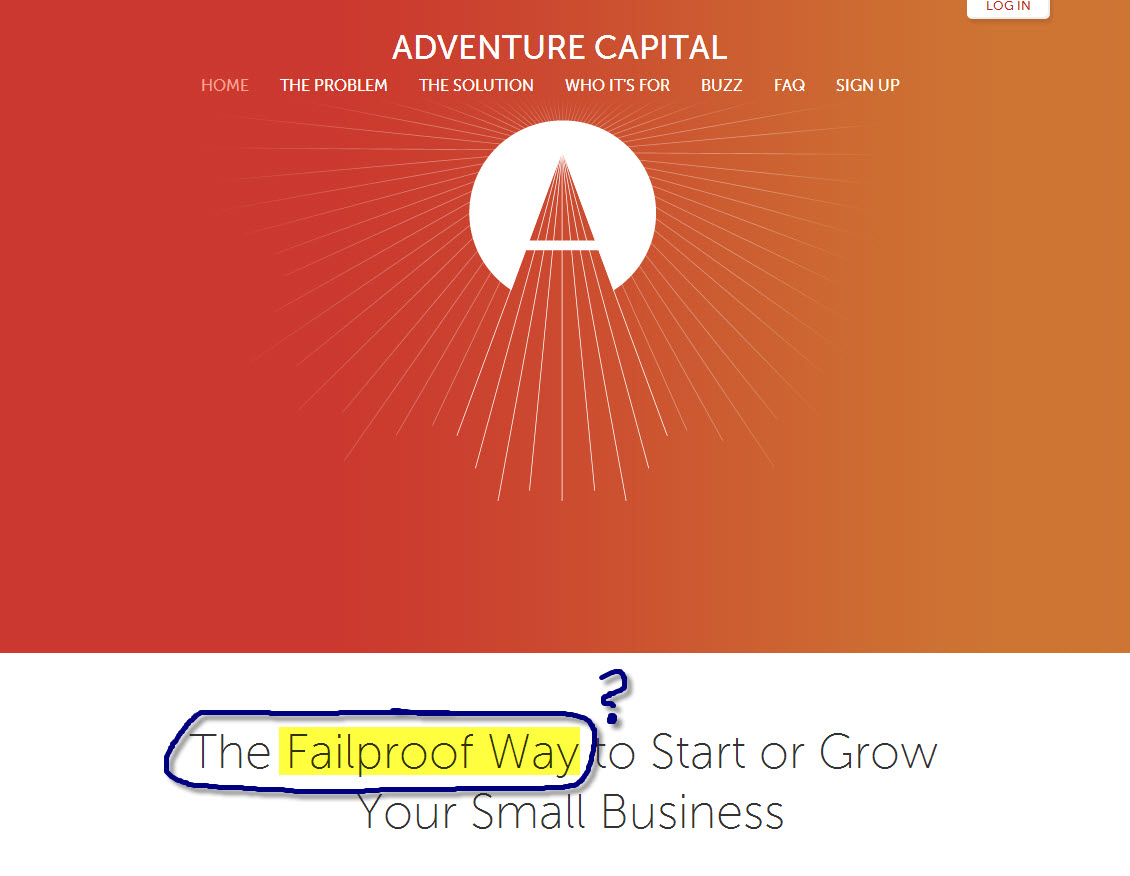(Hint: Not Bloody Likely)
You’ve all heard Ben Franklin’s infamous quote: “…in the world nothing can be said to be certain except death and taxes.” Yes, we’ve got a slew of new technology now, but unless there’s a magic spell I missed, I’m pretty sure you still can’t “fail proof” anything — especially a business venture. There are just too many variables out of your control. Things like:
- The economy at large
- The daily lives of your prospective customers
- The weather
- What your competitors might decide to do
- What your vendors are dealing with
- Politics
- New scientific discoveries
You get my drift, right? There are a LOT of things out of your control. And if anyone — even someone you trust and admire — tells you otherwise, they’re either young and naive or have gone to the Dark Side. Take a look at this one:
 This copy can be found on Chris Guillebeau’s new site, Yearofprofit.com.
This copy can be found on Chris Guillebeau’s new site, Yearofprofit.com.
And while I’ve admired Chris’ methods in the past, this little diddy made the hairs on the back of my neck stand up.
Why? We see this kind of thing all the time online. Why should I care? Why should you?
Because he has so many avid fans and followers. He’s up on a pedestal and that’s a dangerous place — for him and for us. Because when you get that popular, people tend to take what you say as gospel. (And run with it all the way to the poorhouse.)
So I reached out to Chris to ask him about his marketing copy. He didn’t really have a satisfactory explanation for me and asked that I not publish the content of our email exchange. He was polite and cordial, but stressed that he felt that “fail-proof” was entirely possible.
Now let me clarify here: I didn’t start out to write solely about Chris’ web copy. My original intent was to use his as just one example. I hate calling people out publicly. There’s enough negativity on the interwebz as it is, right? But after our email exchange, I felt we needed to spend a little quality time on his word choice.
Let me reiterate here: I think Chris has done a LOT of good in the world. I may not always agree with his methods or word choices, but he’s inspired a whole lot of folks to start a business. To take a leap when they needed to leap. Which might be a small part of the problem.
See, when we focus only on inspiring others to “think big” (world domination anyone?) there’s a tendency to avoid the ugly stuff. The things that don’t work. The stories of people who started something that ended badly.
If you read his $100 Start-Up book, you don’t get any ugly case studies. Everything is pretty much rainbows and butterflies. You’re shown story after story of folks who did what they set out to do — sans the struggles.
After reading all those stories, you might think “Hey, this doesn’t sound that hard. I could do this, too!” Which is definitely what Chris (and other folks who sell inspiration) want you to believe.
I’ve heard these kind of things before from other “gurus,” as well. “It’s simple! You just put up a website and do X, Y and Z and before you know it, you’re quitting your day job!” (If I had a dollar for every person who showed up on my doorstep wringing their hands because they couldn’t get past the technology part alone, I’d be a millionaire.)
People please. Pay attention and ask questions. Even — especially — when you’re getting advice from someone you admire and trust.
Remember: “simple” does NOT equal “easy”
Especially where business is concerned. And second, failing is actually a good thing. If you never fail, you never learn. So quit trying to “fail-proof” your life and embrace the reality that you will stumble and fall at some point. We all do. We’re all human here. And we can all make mistakes. Even me. Even Chris.
If he really believes that strongly in his product (and he has every right and obligation to do so), then why doesn’t he offer some sort of guarantee on his sales page? It’s a logical question. Why doesn’t he tell you the truth? That if you do all the work he’s laid out for you, you still might fail?
What do you think? Do you believe there’s a “fail-proof” way to grow a business?











Tea – I have a bridge in Brooklyn for sale. Want to buy it? it’s fail proof!! Whoever sells you fool proof business is only making his business fail proof. I particularly like it when you say that failing is not really a bad thing. In fact, it can be an excellent opportunity to learn and improve.
You’re welcome, Tea. Years ago I saw Jungian analyst and prolific writer, James Hillman, give day-long talk at the National Cathedral. His focus that day: the Shadow of belief, particularly as it applied to Christianity. It was a courageous move on the part of the Cathedral to invite a difficult and vulnerable dialogue like that. He talked about how it is very common for people to be so attached to their beliefs that the mind becomes incapable of even considering concrete facts which conflict with them. He provided belief-stricken examples from all the major religions. Once defined and proclaimed, beliefs have a hard time with circumstances, which are always changing. Inhabiting one’s beliefs is akin to living in a bubble, which is why they’re so often painfully popped by the reality surrounding them. It feels much better to be assured that your success is guaranteed than to inhabit a space of actual risk and uncertainty. Buying a sense of assurance might feel safer than inhabiting the chaotic, undefinable, ungraspable uncertainty of the world, but when you choose to be okay with the primordial soup, you will find it is precisely where the unexpected, unbelievable outcomes actually manifest. It’s not a matter of BELIEVING what is possible, it’s more a matter of KNOWING unbelievable things can and do happen. It takes failure and vulnerability for innovative solutions to hatch. Which leads me into trickster territory now.. it’s probably pretty tough to create a recurring revenue stream by selling The Mysterious, The Untried, The Unexpected, which is why you don’t see a lot of business models on or offline trying to “sell” it. (Just another reason to join me in the Posse of Possibilities Mastermind Group.)
Failproof? If there really was such a thing I’d have maxedout my credit card and perhaps even more a long time ago and I’d be laughingall the way to the bank by now. I’m with you Tea, any business can fail for manydifferent reasons and often reasons beyond our own control. Anyone marketing a business approach that purports to befailproof is, in my opinion, marketing a scam. I don’t know Chris G. but I’vecome across others who make promises like that and some will even add whatsounds like a water tight guarantee. The problem with that guarantee however,as I know from bitter experience, is that the conditions set to claim theguarantee turn out to be impossible to meet. Yes listen to and learn from the experts in the field of internetmarketing (and Tea is my shining light) but the eventual success is primarilyup to our own willingness to apply ourselves and, if circumstances cause afailure, then only we ourselves can pick up the pieces, learn from what’s happenedand go on from there.BTW Nick Armstrong – “Foolproof? Sure. Idiot-proof? Sure” – I’deven dispute that statement. In my experience, there’s always a fool or anidiot who’ll find a way to crash the system.
Thanks for chiming in, Nick. Those are some good alternative words to be sure. I wonder though if we can even “idiot proof” something? At what level of idiocy do you aim for? And should “idiots” attempt to run a business anyway? Success comes from more than brain power, right? *scurries off to consider the ramifications of this comment on her own work*
I’d say… Failproof is a bit of an overreach.Foolproof? Sure. Idiot-proof? Sure. All that requires is a commitment to doing the work (often hard work, and hopefully – if marketed as a failproof system – easy to follow steps).As much as I like Chris G., a “Failproof” system just doesn’t exist. If it did, most businesses wouldn’t fail before the 5 year mark. If it did, we’d all be able to make rent every month, buy organic food, and fund our retirement accounts (not to mention – afford health insurance). That’s just not happening.I haven’t seen Chris G’s system. But you know – I’ve seen so many “systems” I could poke holes in after 2 minutes that it’s just not right to call any of them “failproof” – no matter how good it might be.Good points here, Tea.
So glad you found this post helpful, Carolyn. Don’t get me started on words like “blueprint” and “6-figures” — I’ve ranted about them here before (which reminds me, I wanted to make an infographic about them…). The problem (I think) is that a lot of marketers learn from the hypey marketers and they perpetuate all of that nonsense until it becomes a standard way of doing business. And then nobody ever asks the hard questions, causing it to repeat all over again.Thanks for lending your voice to this discussion! I hope to see you around these parts again, sometime. 🙂
Hi Tea, love this article, thank you! It hits at the heart at what has annoyed me profusely for so long in the information marketing world. We’ve been doing research on our ‘perceived’ competition and how they position themselves and the words they use…’fast-track, ultimate, brand accelerator, six figures, sky-rocket, blueprint, massive success’ and so much more. What I also dislike about this whole industry is how a one day bootcamp that would normally cost $2977, is absolutely free. Their marketing tactics are to get in the masses with the hype, give them some semi-valuable information for free and then see how many they can squeeze out the other end to part with the big money. I call this unconscious, self-serving, binge marketing. I believe we must earn the right to ask for business and that we must build communities with love like you and Sandy are doing where people simply ask how they can work with you because they believe in what you believe in. Hats off to you both, love your work! xx
Your POV is always so helpful, Nicole. Thank you THANK YOU for stopping by and sharing it here. I hope that Chris steps up and decides to chime in, too. It really IS just about having professional dialogues about the things that matter.
Loved it. Particularly liked this: “because when you get that popular, people tend to take what you say as gospel”. Soo true. Simply wonderful! Even after learning from the best mentors in the world, some people still need to fail to move forward. Judging from my own experience as a learning practitioner as well as someone who tries and fails often, I believe it has a lot to do with how some people learn. For example, I only learn by doing it. How could I get it right the first time? Although, I do get lucky sometimes. I strongly believe the whole concept around failing is wrong. Failing is part of life. It’s the feedback you get when things do go as planned. Everyone failed before, even Chris. After all, it’s all learning. Learning and evolving. Knowledge gained from failure can, at times, be highly valuable. Even Dan Kennedy, with all his fail-proof strategies, says so on his book “How to make Millions with your ideas”. It is millionaire-maker strategy #39: “properly value information, especially when gained through failure”, he says. Believe it or not, this morning I thought about naming my first book “Fail in style” or something like it. 🙂 Would that work? Probably not. After all, I don’t want to fail. haThere is a whole lot of crazy going on out there. I even heard someone I know, who is a highly respect entrepreneur, say: “successful entrepreneurs focus on outcomes, unsuccessful ones focus on learning”. How crazy is that? When did learning become a dirty word? And how can a person learn without producing an outcome? Isn’t an undesired outcome an outcome? And, do successful entrepreneurs ever learn? I am confused. And how about risk-free without guarantee? That is crazy! Also, isn’t taking risks where the fun is? I guess, people should know better. That’s why education is important. It is supposed to help people be more critical and learn how to question statements like this. I mean, self-education. The only education there is. 🙂 . Kudos to you for posting this and for questioning Chris by email.
Tea, this is a very valuable conversation. I don’t know Chris so cannot comment on his work. But I am innately concerned by offers that suggest anything about a business course can be fail proof. It just does not acknowledge individual circumstance. The word itself is spurious. I am troubled too that it has the potential to influence decisions in those that might be gullible, vulnerable or desperate. I recently attended a seven month face to face well accredited business course with 55 other entrepreneurs.We represented a wide spectrum of business. We were coached by the highest level mentors toward an outcome of greater influence and attendant success in our businesses. I observed my own level of hard work and those of the others around me and yet, despite the endeavors of the students and coaches, some succeeded way better than others. Some just fell off the perch. Some were actually damaged by the process. Some have gone from strength to strength. The point is that this was face to face, with accountability included and yet the results were hugely varying. It is also backed up by an ongoing alumni program and still some will succeed and others won’t. It is not possible to comment on the veracity, authenticity or quality of Chris’s failproof course as I haven’t done it. However, the point you raise is whether the word failproof can be used in connection with any online or offline business course. I believe absolutely not. It flies in the face of our understanding of human experience. Just think school and college. Same place, same courses, curriculum and tutors. Is everyone guaranteed failproof results? How then can a rote online course without the benefit of individual coaching even begin to suggest so? There’s an arrogance about the term. it reminds me of one of the most unpleasant experiences I had in the early years of attending online marketing conferences. After three days of being spellbound by the possibilities of making untold fortunes using such failproof methods as advocated by the presenters, on the last day we had a coach, practised in NLP deliver us a motivational session. At the end of it he said. “You have been given the tools, if you don’t succeed, it will not be because of them, but because of your mindset” or words to that effect. Now there’s a reverse guarantee for you if ever you heard one.Not there fault, but ours. ‘Fail proof’ as a method expresses the same intent.It is a discussion that should be continued. Thanks for keeping it going.
First Tea I want to say I admire your courage because I know you, and I know you aren’t trying to get traffic by calling out, heckling, etc. In fact you bent over backwards to accommodate Chris, including removing his emails he sent to you about his program (personally I learned my first year in corporate America don’t put anything in an email you wouldn’t want on the front page of a newspaper). It can be easy to say buyer beware, shrug and move on. You took this road, despite it being the harder one for you, because you believe in it.Now about the content of his page, I have a very different perspective from most people as I come out of a corporate environment in the financial services sector. No publicly traded company would ever say their business plan is “failproof”, and if such a thing existed Chris would be on speed dial for the entire Fortune 500 list.I don’t know Chris personally, and I love his concept of non-conformity, I even have the book. So let’s say he believes his method is failproof for success as he defines it. Then why not define success? Why not clearly lay out a guarantee? (Before you put any money on the table, because the contract starts when money is exchanged for goods or services). That is what I find disturbing. An unwillingness to discuss it openly. In fact this whole scenario reminds me of an issue that took place in the financial services sector about 4.5 years ago. I wondered – how could so much money be involved? So many people, smart people, pay in? Turns out for a long time it did pay. You could get in on a great deal, with guaranteed results, but were asked to move along if you inquired too closely on the details. No one wanted to rock the boat. Then one day the other shoe dropped and the greatest fraud in recent US history was revealed. Let me be clear – I am NOT saying Chris is any of these things, in fact he may fully believe he has a failproof system and wants to share it. I AM saying that the lack of disclosure raises questions, and it should. Tea has opened the door for an adult, professional dialogue. I truly hope Chris steps up to the plate and engages all of us about this. I want to hear his side, and I hope it can clear things up so people can invest in his program based on facts, not rhetoric.
Thank you, thank you, THANK YOU for talking about this. Ever since I first planned on quitting my job and going solo, I’ve been bombarded by “fail-proof” ways to do this and “surefire” ways to do that. It makes for good headlines, but really, that’s about it. I agree with the comments already posted that perhaps Chris meant it in a different way, but when the Average Reader stumbles on a title like that, they take to mean, “Follow this and you won’t fail.” It’s unfortunate, and in some cases, dangerous when someone is pinning their hopes, dreams, and savings on something they consider to be foolproof. (I’m not saying Chris is predatory, nor are most people who use that attention-grabbing style, but there are predators out there.)I participate in several online forums for freelancers and solos, and I am always stunned at the number of newbies who think they can start a business with $0 cash outlay. They are often stunned when they realize that there are actual costs involved with working for yourself. But nobody ever talks about that in the world of “how to,” They typically only tout how cheaply you can run a solo business from your couch. True, it costs less than a brick-and-mortar business, but you’re going to have to lay out some cash. Being in business means failing. We all fail every day. Sometimes in small ways, sometimes in epic barn-burning ways. I prefer realistic advice to grandiose statements any day.
Here’s to all the inspirational folks (like you) who can hold both concepts simultaneously: that anything is possible AND nothing is guaranteed. *raises glass of something sparkly*I’ve got a year-long program, too (Digital Dining Room). But the difference between his and mine (besides it being half the price) is that you’re not getting pre-recorded modules. You’re getting three LIVE classes each and every month + homework + interaction with your peers AND me. If I gave you the whole course at once, you’d be overwhelmed and throw your hands in the air. That’s likely why he’s eeking things out over 12 months, too. Although – It did feel a bit weird that he wanted to have a year long class but without forums (or did I misunderstand that?)…isn’t community part of the learning process? Don’t we learn best from each other? Of course we do.Also – my guarantee = if you don’t love it, ask for your money back (within the first 30 days). After that, you can cancel at anytime. And if you don’t agree after 3 months that it’s the best value/class you’ve ever seen, I will eat my hat. But I can’t promise you a rose garden. Or a fail-proof business. I can only promise that you’ll get way more than you expected, that you’ll meet new people and — if you put everything you learn into practice — you’ll make positive progress in your business.Thanks for being here, Birdy. Your perspective is much appreciated!
(and other folks who sell inspiration) NOTHING happens without belief.That said, there are no guarantees in life either. The method CANNOT be ‘failproof’ if it’s intended for more than one being. We each have our individual mix of traits, understandings, learning capabilities, tech availability etc..And to tell you that you need to be sending him money before anything is said? Did he honestly expect you to drink that KoolAid???Besides, if his knowledge that he’s passing on is so slender, why take a year to say it?
You’re one smart cookie, Melanie – that’s part of the reason we love you so much. Thanks for chiming in, too. Also – I’m totally gonna use that “have the crust to stand behind it” somewhere in my copy.
I say if you’re going to make a claim of any kind, then have the crust to stand behind it … and stand tall. I’m getting the icky feeling Chris isn’t doing that and that not only disappoints me, it causes me to recoil.There’s a bushel basket full of value in your post, Tea, and the reactions from your readers are priceless. I wouldn’t purchase any product or program touted as “fail proof” unless there was an iron clad guarantee attached.
It may be worth pointing out that at least two people I’ve thought highly of, Steve Jobs and Robert Downey, Jr., shared the unique distinction of being “one-time has-beens”.
While I’ll admit that there is no failproof way to GROW your business, I believe that you CAN have a failproof method for starting one.For any type of business, there’s lots of basics that entrepreneurs need to know about like business type, taxes, Federal tax ID numbers, etc. These items are huge foundational issues that should be setup properly and legally before anyone starts a business.Now in regards to having a failproof way to grow your business, you’re absolutely right – it doesn’t exist. There’s just way too many variables. What works for my graphic design business won’t work for the local mom & pop store. The marketing methods of my husbands I.T. business may or may not work for an Etsy store owner.What I have found that works for me is watching and listening to educated and knowledgeable people and applying what they say to my own business. If it works, fantabulous! If not, either chunk it or put it aside to use later when business/economy conditions change.
Yeah, I’m not sure what to make of the “NOTHING CAN POSSIBLY GO WRONG!” tone there. The article that’s been making the rounds on survivorship bias is relevant here.You don’t necessarily learn much studying winners, except maybe that they got the breaks when they needed them, and managed to make it through the disasters when they happened. You learn a lot more studying the screw-ups, especially when you begin to notice common mistakes; don’t make any of those.The cost involved in Chris’ program is pretty exciting as well: $1800 for a year’s worth. I can’t possibly justify that, even if the copy around it made sense. (It is a very nicely designed landing page, though. I’m taking some pointers from that, so it’s not a total loss…)
ah, I’m not sure that it would be on netflix. It’s a web series in partnership/branscaping with Yahoo. Here’s the site: http://failureclub.org – love that it’s started a movement!! Definitely a Spurlock fan as well… and I’d say he’s doing things right with his celeb status. I’m a fan of Chris but I’m also a TRUE non-conformist so I have yet to go to World Domination Summit… even though I’ll be in town, I’m unconferencing. 😉
I love this web series show that Morgan Spurlock (that Supersize Me guy) help put together called “The Failure Club”… I love the premise of it. Airing the dirty laundry. if you haven’t heard of it, it’s a good little documentation of people conquering their fears and starting a goal and failing their way through the process. The funny thing is it turns out to be much more of a success when you can admit from the get-go that this is an exercise through “failure”. I LOVE failure. I love the idea of creating a product with failure written all over it. I want to honor it. Not kick it to the curb and say it’s fail-proof. I WANT more failure in my life. 😛 And yes, I believe ‘fail-proof’ is just a marketing buzz word to make something look more enticing. That and a trusted name and brand puts it over the top. I’ll fall for it too.. I already entered to try to win a spot. But I wouldn’t buy it. 🙂
I think it depends on your definition of “failing”…Most people use a definition similar to this: “if it doesn’t meet my expectations, then it’s a failure.”In which case, I would say you could always be a failure. In Chris’ case, he makes it clear that the “fail-proof” way to build a biz is “about creating something truly valuable—and reaching more people with your offers.”That, in and of itself is an arduous process, and full of potential failures if you use that previous definition. But once you do create a thing of value and get it to the right people it’s practically impossible to “fail” – if you define failing as not making a profit.It’s sticky, to be sure.
My pleasure 🙂 It annoys me every time I see someone fall for those kinds of things.
There is no fail-proof.And I will stand here and say, loudly if necessary, that there SHOULDN’T BE such a thing as fail-proof.Why? Because failure is what teaches us to course-correct. Because failure is what enables us to truly know how sweet our successes are. And because without failure, we’re probably not doing a damn thing at all because failure is part of life.There is no way you can take a risk without risking failure, and taking a risk is the only way to do something you’ve never done before.Hey, thanks for the soapbox time, Tea. 😉
Nothing is ever fail-proof. Somehing I wish more people would apply to wht they click on and what they buy is: If it looks too good to be true, it most likely is.
Great post and even though you may be burning a bridge it is something most need to read. I embrace my failures because without them I would not be in the next phase of my business and doing what I love. Many people follow blindly because they believe that someone who is successful has a foolproof method that they need to plug into. Your message needs to be put out there and taken to heart by those who think it is easy.Thank you for putting yourself out there and sharing your thoughts, I am sure that could not have been easy.
I stand with you, Tea. Even if people don’t take this literally, it’s still very persuasive – A+ from a convert-at-all-costs perspective! – and it *will* build on an already-established sense of trust that Chris G has worked hard to achieve to create an unrealistic expectation in the minds and hearts of people who sign up for this. And THAT is the problem. I agree completely: if you really think it’s failproof, lemme see that unconditional, no-questions-asked money-back guarantee. Otherwise, I think it’s problematic and misleading at best.
THANK YOU Tea… for publishing this.Mainly because I think a lot of people (myself included, although that’s shifting) are afraid to take a stance or state something that could be “perceived” as negative in regards to someone who has “made it” (I think Chris G. is great and have read both books, but he’s certainly achieved the “celebrity status” online). There is no “fail-proof” way to build a business. Period. Is it great copy? Yes, because I don’t think many people will look at that and take it literally, but it will inspire many to purchase. But that’s also because people trust Chris Guillabeau.Would the same copy work for a less known person? Probably not, or at least not as well.More than anything I love that you’re challenging people to think for themselves.Thanks for having the courage to write this!